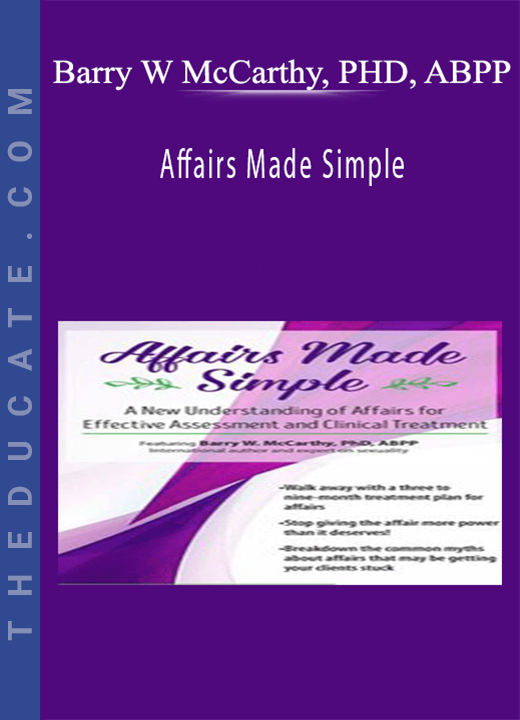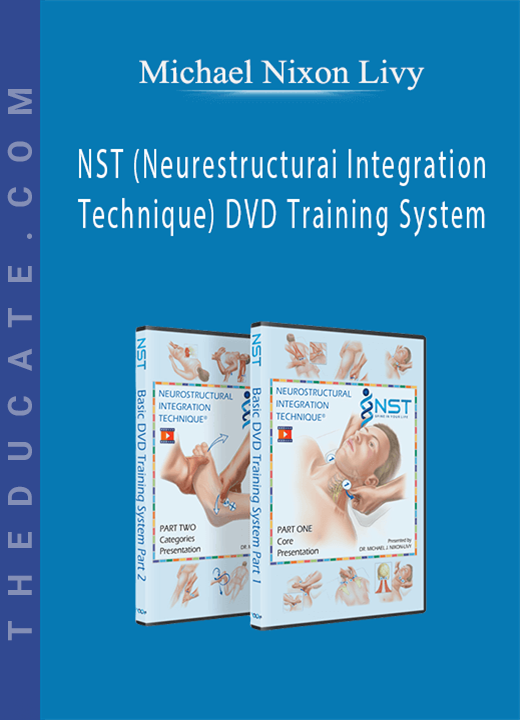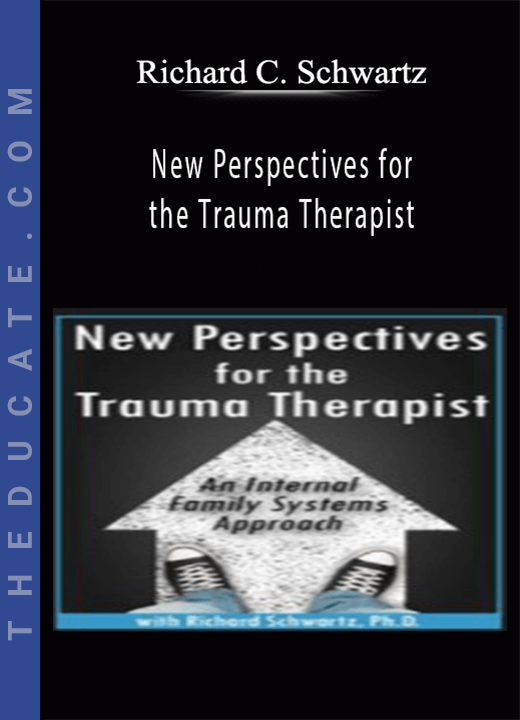Description
Affairs Made Simple: A New Understanding of Affairs for Effective Assessment and Clinical Treatment – Barry W McCarthy, PHD, ABPP
Affairs are all too common, approximately 35-45% of marriages experience an affair, and as a clinician you likely have a couple or individual on your case load who is struggling with the wounds of an affair.
Watch this recording and leave with a three to nine-month treatment plan for affairs that save your clients’ time, money and energy! This is a huge improvement from the traditional model that takes years to treat couples who’ve experienced an affair.
Most clinicians are approaching treatment wrong by giving the affair more power than it deserves, which causes the injured partner to get stuck. Rather than remaining stuck in the traditional model of an affair as a symptom of a relationship problem, this workshop provides you new skills in understanding, assessing, and treating affairs through a whole new lens.
Affairs are multi-causal, multi-dimensional, with a range of individual, couple, cultural, and value factors and meanings. Successful treatment requires you to carefully assess (rather than assume) the causes and meanings of the affair from the perspective of the involved and injured partners. Through this workshop, you will develop an effective model for assessment which leads to more successful clinical outcomes.
After watching this recording, you will be more prepared as a clinician to help the couple make a “wise decision” about whether to recommit to a satisfying, secure marriage or move toward a good divorce. If the decision is to recommit, you will gain skills to support the recommitted couple with tools for sexual recovery and creating an individualized affair prevention plan.
Stop giving the affair more power than it deserves and gain a new understanding on how to more effectively treat affairs!
- Analyze types of affairs based on emotional factors, sexual factors, gender factors, and cultural values to better inform clinical assessment and treatment.
- Utilize a four-session assessment model for a comprehensive psychobiosocial assessment of the injured partner, involved partner and the relationship to make better treatment decision.
- Develop a treatment plan congruent with the goals of the individuals and couple to heal after an affair.
- Create a genuine narrative about the affair which is accepted by both partners and facilitates a “wise decision” about whether to recommit to the marriage or move to divorce.
- Create an agreement for couples who recommit to monogamy as part of affair recovery, as well as, one for couples who adopt a consensual non-monogamy agreement.
- Design an individualized affair prevention plan which addresses the vulnerabilities and goals of each couple.
Get Affairs Made Simple: A New Understanding of Affairs for Effective Assessment and Clinical Treatment of author Barry W McCarthy, PHD, ABPP
Confront Myths and Mistaken Assumptions about Affairs
- Affairs are always a symptom of a relationship problem
- Most couples divorce after an affair
- Rebuild the trust bond before anything else
- Touching and sexuality should not be attempted in the first year of healing from an affair
- New data, research and cultural changes on the role, meaning, and outcome of affairs
Implement a Four-Session Assessment Model
- Importance of conducting first session as a couple
- Conduct the psychological, relational and sexual history individually
- How and when to disclose sensitive, secretive information
- Role play aspects of the couple feedback session
Treatment Model for Different Types of Affairs
- Understand the different types of affairs
- High opportunity/Low involvement affair
- Compartmentalization affair
- Comparison or love affair
- Most vs least common type and easiest vs hardest type to treat
- Do not give the affair more power than it deserves
- Help couple understand the type of affair
- Six month “good faith” effort to make genuine meaning of the affair
- Indicators the couple can recommit to the marriage
- Signs the couple may benefit from a “good divorce”
- Create a new couple sexual style and a new trust bond
- Foster genuine acceptance and forgiveness
- Tools for sexual recovery
- An individualized affair prevention plan
Vulnerabilities and Challenges with Affair Prevention
- Awareness of vulnerabilities regarding person, mood, and situations for future affairs
- Confront the myth that “once a cheater, always a cheater”
- Dialogue and agreement about monogamy vs. consensual non-monogamy
- Confront the manipulative or coercive partner
- Value of satisfying, secure, and sexual relationship
- Respect that “sexually, one size does not fit all”
Cultural Considerations in Understanding the Role and Meaning of Affairs
- Non-American cultural differences
- Religion, politics and social economic class
- Special considerations with gay and lesbian couples
- Keep personal value and judgement aside when meanings differ
Clinician Personal and Professional Values Regarding Affairs
- Assess your personal values regarding affairs
- Tools to define your interest, competence, and values
- Be aware of personal values and judgements when client meanings differ
- When to refer due to differing values







6 reviews for Affairs Made Simple: A New Understanding of Affairs for Effective Assessment and Clinical Treatment – Barry W McCarthy, PHD, ABPP
There are no reviews yet.